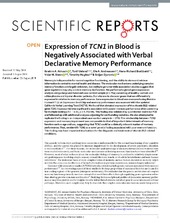| dc.contributor.author | Akkouh, Ibrahim | en_US |
| dc.contributor.author | Ueland, Torill | en_US |
| dc.contributor.author | Andreassen, Ole Andreas | en_US |
| dc.contributor.author | Brattbakk, Hans-Richard | en_US |
| dc.contributor.author | Steen, Vidar Martin | en_US |
| dc.contributor.author | Hughes, Timothy | en_US |
| dc.contributor.author | Djurovic, Srdjan | en_US |
| dc.date.accessioned | 2019-05-27T12:51:50Z | |
| dc.date.available | 2019-05-27T12:51:50Z | |
| dc.date.issued | 2018-08-23 | |
| dc.Published | Akkouh I, Ueland T, Andreassen OA, Brattbakk H, Steen VM, Hughes T, Djurovic S. Expression of TCN1 in Blood is Negatively Associated with Verbal Declarative Memory Performance. Scientific Reports. 2018;8:12654 | eng |
| dc.identifier.issn | 2045-2322 | |
| dc.identifier.uri | https://hdl.handle.net/1956/19730 | |
| dc.description.abstract | Memory is indispensable for normal cognitive functioning, and the ability to store and retrieve information is central to mental health and disease. The molecular mechanisms underlying complex memory functions are largely unknown, but multiple genome-wide association studies suggest that gene regulation may play a role in memory dysfunction. We performed a global gene expression analysis using a large and balanced case-control sample (n = 754) consisting of healthy controls and schizophrenia and bipolar disorder patients. Our aim was to discover genes that are differentially expressed in relation to memory performance. Gene expression in blood was measured using Illumina HumanHT-12 v4 Expression BeadChip and memory performance was assessed with the updated California Verbal Learning Test (CVLT-II). We found that elevated expression of the vitamin B12-related gene TCN1 (haptocorrin) was significantly associated with poorer memory performance after correcting for multiple testing (β = −1.50, p = 3.75e-08). This finding was validated by quantitative real-time PCR and followed up with additional analyses adjusting for confounding variables. We also attempted to replicate the finding in an independent case-control sample (n = 578). The relationship between TCN1 expression and memory impairment was comparable to that of important determinants of memory function such as age and sex, suggesting that TCN1 could be a clinically relevant marker of memory performance. Thus, we identify TCN1 as a novel genetic finding associated with poor memory function. This finding may have important implications for the diagnosis and treatment of vitamin B12-related conditions. | en_US |
| dc.language.iso | eng | eng |
| dc.publisher | Springer Nature | eng |
| dc.rights | Attribution CC BY | eng |
| dc.rights.uri | http://creativecommons.org/licenses/by/4.0 | eng |
| dc.title | Expression of TCN1 in Blood is Negatively Associated with Verbal Declarative Memory Performance | en_US |
| dc.type | Peer reviewed | |
| dc.type | Journal article | |
| dc.date.updated | 2019-01-07T13:40:21Z | |
| dc.description.version | publishedVersion | en_US |
| dc.rights.holder | Copyright 2018 The Author(s) | |
| dc.identifier.doi | https://doi.org/10.1038/s41598-018-30898-5 | |
| dc.identifier.cristin | 1612267 | |
| dc.source.journal | Scientific Reports | |

